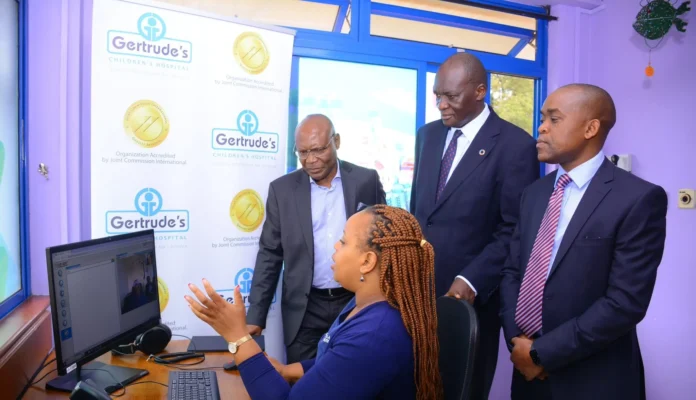When Covid-19 happened, none of us thought anything new could’ve come out of it, it was a period of chaos and uncertainty, but that didn’t stop some of us from thinking on solutions that would be immune to circumstances such as covid. One such initiative born during this difficult season was Daktari Smart which since its launch in 2021 has made significant strides in providing specialized pediatric medical care to children in Kenya. Daktari Smart is a program run by Gertrude’s Children’s Hospital, Gertrude’s Hospital Foundation, and the M-PESA Foundation which aims to reach and treat at least 32,400 children in five counties during its initial phase.
A Comprehensive Initiative
Daktari Smart is currently focused on Narok, Samburu, Baringo, Homa Bay, and Lamu counties, and has since reached 10,000 children with specialized pediatric medical care. Over the next five years, Gertrude’s Children’s Hospital alongside its Foundation aims to impact 5 million children in these regions while directly providing care to 45,000 children who are suffering from rare and complex non-communicable diseases such as cancer and cardiovascular disease.
Importance of Telemedicine
Speaking at the commemoration of World Health Day, Gertrude’s Children’s Hospital CEO Dr. Robert Nyarango emphasized the importance of telemedicine technology in providing quality, affordable care, increasing coverage, and lowering preventable childhood deaths.
“The Daktari Smart program has been implemented in five counties, enabling 10,000 children to access specialized pediatric care they might otherwise not have received,” said Dr. Nyarango. He highlighted the opportunity to serve more children by increasing the number of counties participating in the program.
World Health Day and Telemedicine
The theme for World Health Day in 2024 “My Health, My Right ” emphasizes the importance of health as a right that should be available to everyone. According to the World Health Organization (WHO) expanding access to healthcare services is crucial and telemedicine technology can play a role in achieving this objective.
A study conducted in 2022 revealed that Kenya has an average of 13.8 healthcare workers per 10,000 individuals, which’s significantly lower than the WHOs recommended ratio of 44.5 doctors, nurses and midwives per 10,000 people. This shortage results, in challenges when it comes to accessing healthcare services in areas.
Support for Telemedicine Regulations
Dr. Patrick Amoth, who is currently serving as the Acting Director General, for Health at the Ministry of Health stressed the significance of technology in enhancing healthcare accessibility. Assured backing for telemedicine and other health technology ventures.
According to Dr. Amoth telemedicine holds potential in reaching out to individuals in areas. He revealed that regulations are underway to facilitate the implementation of e health, m health and telemedicine while taking into account aspects, data security and privacy.
Role of Safaricom and Future Prospects
Karen Basiye, heading Business and Social Impact at Safaricom PLC advocated for collaborations and investments to sustain the impact of health tech programs like Daktari Smart.
Basiye highlighted how technology is playing a role in healthcare by enhancing access through solutions. She underscored the necessity for partners and funding to bolster technology projects aimed at enhancing healthcare accessibility and inclusivity.
The Daktari Smart Telemedicine Kit
The Daktari Smart telemedicine kit includes medical devices such as an electronic stethoscope, vital signs monitor, dermascope camera, ultrasound machine, otoscope for examining the inner ear and an electrocardiogram (ECG), for monitoring heart rhythm and electrical activity.
In contrast, to video calls the Daktari Smart kit lets healthcare providers in partner centers utilize the equipment on patients allowing expert physicians, at Gertrude’s Children’s Hospital to remotely diagnose and provide advanced medical treatment.
